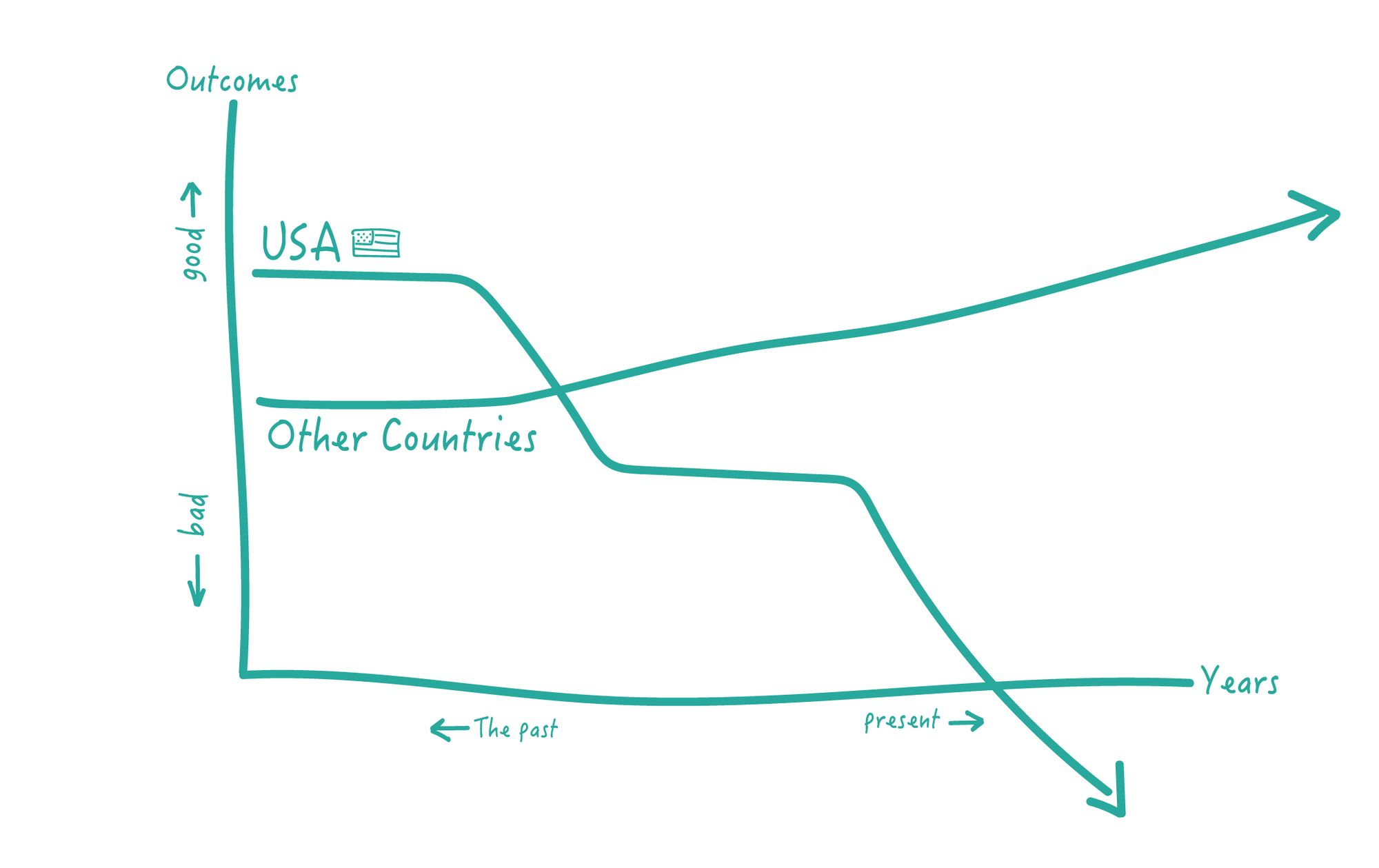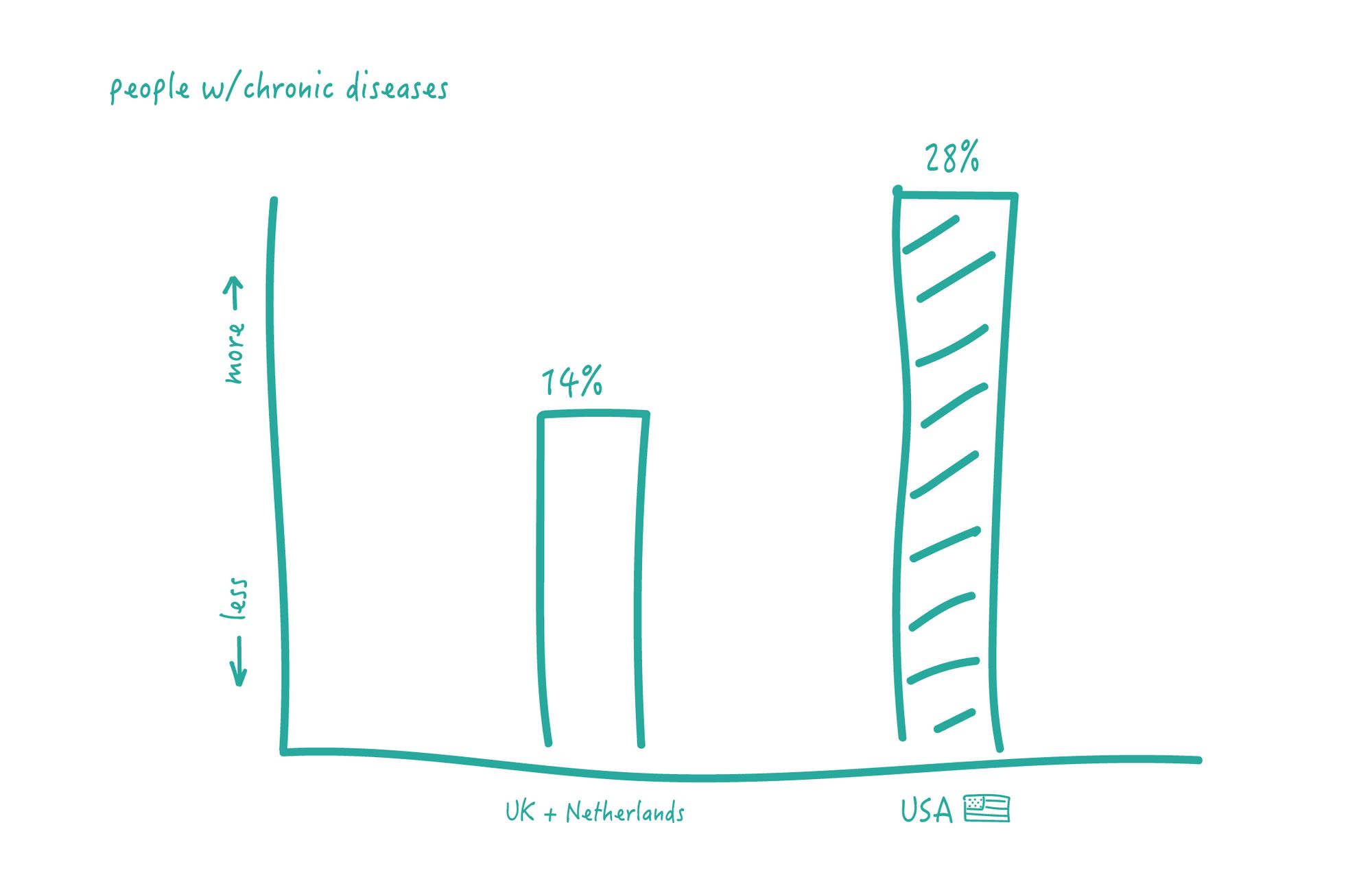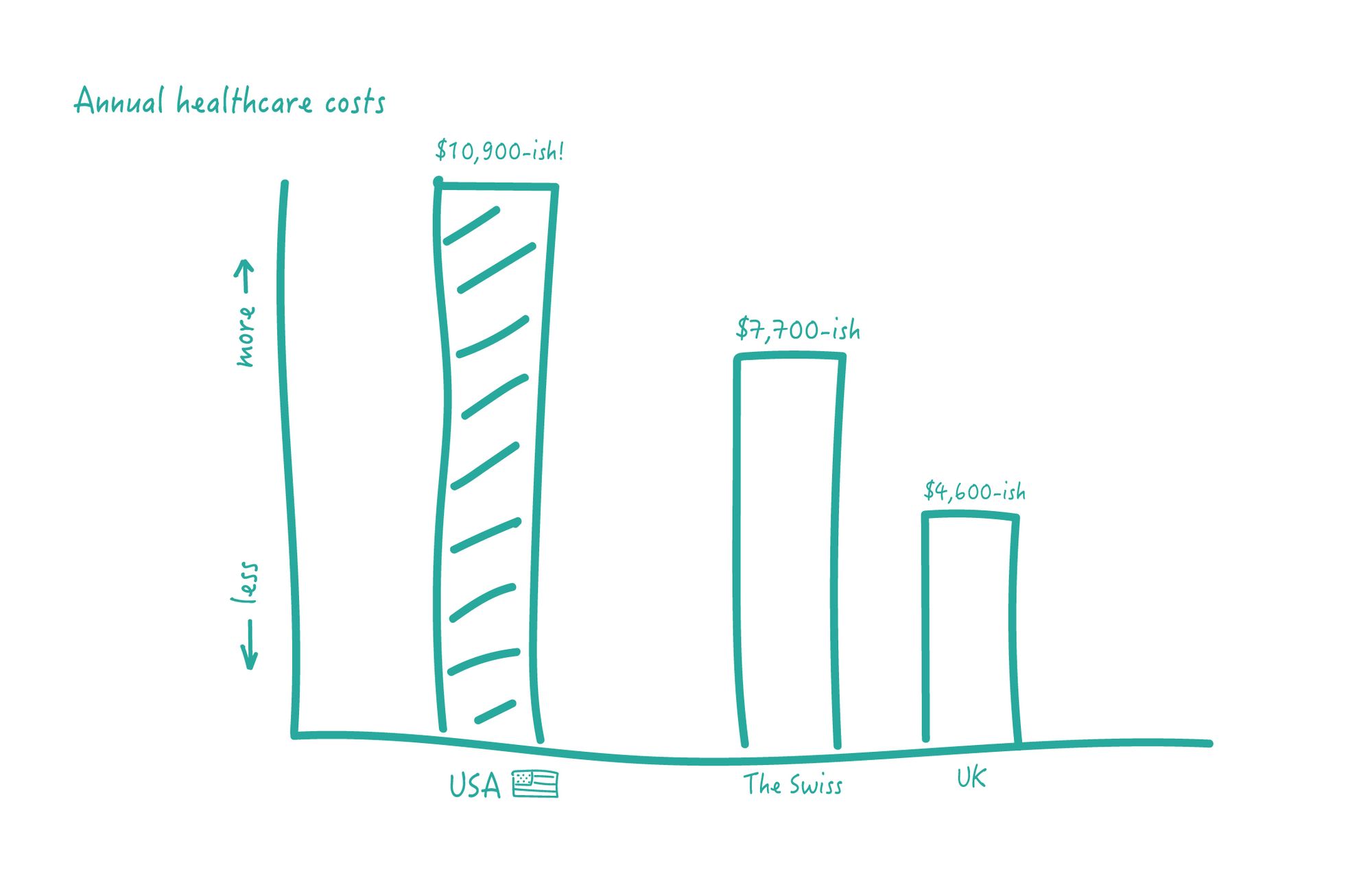The United States Has The Worst Healthcare in the World

Since we’re finally through the pandemic (LOL), I suppose it’s time to talk about our healthcare system more broadly.
In an effort to understand views about our healthcare system, I conducted a non-scientific survey on social media. I was able to confirm that this is indeed a very controversial topic, but unable to determine almost anything else. That’s the problem with any topic that is political, isn’t it? Everyone judges the whole program based on their own limited perspective.
Your view of the American healthcare system is probably relative to your current personal experience. This includes your means to pay for healthcare, but also your specific healthcare needs. For example, if you have reasonable health insurance, no outstanding bills and your teeth are relatively straight, you may have a more rosie view than someone with an overbite that is filing bankruptcy due to overwhelming medical debt. If you’re one of those people with a mysterious chronic illness you’ve been trying to resolve for years, your opinion is probably skewed negative, even if unreasonable.

I remember a conversation with a colleague about the problems with our healthcare system. This was in the heat of the debate about The Affordable Care Act before it had been passed (now affectionately known as Obamacare). My friend said “I don’t care what other countries are doing. We can do something more innovative.” In other words, we can create something new that, much like everything else that our Country has done, is much better than everyone else’s country.
It’s popular to feel strongly about how we do healthcare in the United States, but it’s not popular to change it. Some say our healthcare system is the envy of the rest of the world. Some claim we need to convert to Socialism (a curse word in The United States). As it stands, we have a highly regulated system, designed to protect patients and ensure coverage. Meanwhile that system has resulted in limited free market competition, which tends to drive up costs, and stifle innovation.
When the market was more competitive, there were millions of people who could not access healthcare for various reasons. As Obamacare swooped in, another 18 million people were able to get health insurance. Are we better off now? If the answer to our woes is “having health insurance” then maybe. But the data tells us we are not better off.* Here’s why.
Footnote: All this data is referencing developed countries.
We spend more on health care than any other country.
The cost of healthcare has been increasing since the 1980s, but so has the cost of a postage stamp. Unlike stamps, the increase in healthcare costs has outpaced the growth of the economy. Also, the demand for healthcare has gone up while I’m not sure the demand for stamps has. As of 2019 data, we spend 16.9 percent of GDP which is about $10,966 per person annually. Second in line is Switzerland at $7,732 and the United Kingdom lands at about $4,653 annually. What’s worse is that our public programs (Medicare, Medicaid, etc.) equal roughly about what the UK spends in total per capita.
We’re all thankful that another 18 million people were able to acquire health insurance, however, health insurance is not healthcare. It is an undesirable middle man that adds additional costs and red tape to the healthcare process.

So let me break this down for you. We are spending double the average of the other 11 countries in the top 12. On the bottom of that list is the third world country known as The United Kingdom. If we’re spending 235% of what the English are spending, does that mean that we have 235% better healthcare?
No. It doesn’t. Here’s why.
We have the worst chronic disease
When we become adults, our bodies start to break down. Of course, we accept that, but we may have accepted too much. Over 28% of adults report being diagnosed with a chronic disease like heart disease, diabetes or arthritis, well ahead of Canada in second place at 22%. All other developed countries are under 20% with The UK and The Netherlands at 14%.
Our Healthcare system addresses this by treating these chronic conditions with pills that may neutralize the symptoms. In the case of diabetes and arthritis, most patients take a drug for the rest of their lives with their burgers and fries. One of the leading causes of muscle and joint inflammation is sugar. You know where to find sugar?
Ketchup.
They say the average American consumes 152 pounds of sugar in a year. That's 3 pounds per week–the size of a bag of apples. Sugar is hidden in everything. Not just ketchup, but bacon, sausage, yogurt, most sauces, salad dressings and almost all packaged foods. We're probably not going to change our chronic health issues before we change that.
Notably, certain foods linked to cancer are illegal in European countries, where health outcomes are better. Meanwhile, The US subsidizes crops like grains, resulting in a harmful imbalance in foods that are available, making low quality grains more accessible than fruits and vegetables. This plays out in the American diet.

We’re not preventing the preventable diseases
Because we are front loading our food supply with sugars and highly processed grain foods, we’re not only tolerating disease, we’re increasing its prevalence.
The US is among those with the highest rates of hospitalizations from preventable causes like diabetes and hypertension. We lead other countries by about 50%. Currently, a doctor’s job is to clean up the mess you’ve made. What if they started with nutritional coaching? Imagine a system where a healthcare worker’s goal was to reduce your need for their services, by helping you prevent disease–notably, the opposite of the standard for profit goal.
On the contrary, we have a rate of about 800% more hypertension than the best performing countries. We lead the world in avoidable deaths, from causes such as chronic diseases and cancer, a damning result on the metric used to evaluate the performance of a country’s healthcare system.
We have the worst life expectancy
Many of the increases in the cost of healthcare are credited to advancements in technology. The advancements of technology have benefited the entire industry. That is, they have benefited everyone except the patient. We can tell by the results. For example, the US has the lowest life expectancy amongst the developed countries.
Covid didn’t help us with our stats, resulting in a decrease of average life expectancy, but neither did the amount of sugar we consume. Because we accumulate chronic diseases caused by poor diet and failed approaches to treatment, our life expectancy is lower than that of other developed countries. The USA sits at about 78 years, beat out by most countries including The UK and Germany at 81 years and Switzerland leading at almost 84 years.
We have the worst suicide rates
Anxiety and depression and other mental health issues have skyrocketed in recent years. It’s unclear whether part of the statistics are due to an increase in diagnosis, but mental health issues, including suicidal ideation, have been on the rise. Mental health, like many other illnesses, is a disease that is the result of multiple factors, including nutrition and quality of healthcare.
While most health insurance plans are required to cover mental health and substance use disorder services, rarely do we look at the mental health or any other health category as part of a whole person. If we did, we might address more health needs holistically, rather than narrowly focused on treatments that address single symptoms.
According to “This is Your Brain on Food” by Harvard-trained psychiatrist and nutrition expert Dr. Uma Naidoo, a 2019 cross sectional research initiative found correlations between diet and depression. The study found that, among people dealing with chronic depression, 30.3% ate fried foods, 49% drank sweetened soda and 51.8 percent ate sugary foods 3-7 times per week.
Sugar contributes to depression, and makes it worse or more likely to reoccur. Yet we start our treatment of mental health issues, socially by shaming them (because it’s not cool to go to therapy) and medically, with pharmaceuticals, but Dr Uma says that is not effective.
“There are several approaches to treating anxiety. Only 50-60% of people respond to medication and psychotherapy, and only a quarter of patients have complete resolution of their symptoms. A crucial part of battling anxiety is making sure your diet is full of foods that are calming and free of foods that put you on edge.”
We have the worst rates of obesity
This is the topic we’re not supposed to be talking about, because it’s personal, and uncomfortable. The United States is united in leading the world in obesity. This is both the cause and the result–our healthcare system treats symptoms, and ignores prevention and as a result diseases burden the system.
Obesity is, in essence, chronic inflammation. The Cleveland Clinic published an article that talks about inflammation, and the science of obesity.
“The science of obesity offers an example. We’re learning more about how obesity triggers a cascade of inflammation that leads to metabolic conditions such as insulin resistance. Understanding exactly how that cascade works could lead to treatments for such conditions.”
I’ll simplify this to make a point.
- Inflammation is your body fighting toxins.
- Toxins cause inflammation.
- Constant inflammation causes plaque, a toxin.
- More toxins cause more inflammation.
When your body is focused on fighting toxins, it is not focused on processing nutrition, resulting in diseases including obesity. Inflammation is the cause or a major factor of all diseases.
Medical debt is the cause of most Bankruptcies
Over 91% of Americans have health insurance. Still, at least 40% of bankruptcies are due largely to medical bills. These personal bankruptcies are mostly middle class families too. For many more, medical debt is a burden, not to mention the burden of paying for the health insurance plan, or staying at a job based on access to an employer based plan.
Ronald Reagan released an LP in 1961 speaking out against the evils of “socialized medicine”. His 11 minute and 46 second speech was compelling and moved his supporters, laying the groundwork for his presidential win in 1980. Socialized medicine has been demonized, yet ironically the manifestation of it is taken for granted as senior citizens have access to Medicare as a right of their citizenship. In other countries, a similar service is universal, costs are lower, and statistical outcomes are better.
So if our costs are the highest, our outcomes are the worst, and many citizens are oppressed by the costs of their “Affordable” healthcare, how can we, in any context, claim superiority over the healthcare of other nations?
So what do we do?
The immediate argument against a public health coverage program is always going to be to demonize it by using the word “socialism” to draw a negative response from liberals and conservatives alike. People will talk about patients waiting in line for months or years for life saving surgery while they bleed to death. They’ll talk of death panels deciding who gets what treatment, and who gets to die. They’ll talk about people traveling to the USA to get treatment, and overlook Americans traveling away from the USA for the same. They will simply claim we are the envy of the world, a shining city on a hill. No matter what we tell ourselves, the facts are not on our side. Our healthcare system from end to end has failed us.
Sure, we’re a shining city on a hill, but there are a lot of sick people up here.
The data tells us how we're doing. While many bloggers have opinions proposing idealistic solutions, a truly plausible solution is yet to be identified. Politics and public opinion seem to tell us the only proven solution is evil. We’ve already got the template, the testing and the resources implement that solution.
Are we too proud to see it?
---
Carrie Herndon, a Nutritional Therapist contributed to this article. She is married to the author. You can find more information about her practice at https://shapewellness.co/.
Data not already linked in this article is sourced from The Commonwealth Fund and Health Systems Tracker.
